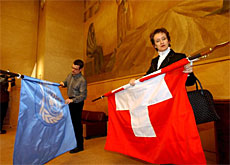
Swiss move to increase security at United Nations

The United Nations has asked the Swiss government to step up security at its Geneva headquarters to protect against possible terrorist attacks.
The federal and cantonal governments are implementing new security standards at UN buildings around the city.
High-ranking UN officials became aware of the world body’s vulnerability following last year’s bombing of its offices in Iraq. The attack killed 22 people including special UN envoy Sergio Vieira de Mello.
The incident revealed lax security measures at UN buildings and led the UN to invest heavily in providing better security for its staff and sites.
Officials have defined minimum security standards which are now being implemented around the globe.
The consequences are being felt at the UN’s European headquarters in the Swiss city of Geneva.
The head of information for the UN in Geneva, Marie Heuzé, confirmed that a “medium threat” to the site exists and that “the UN officially asked the Swiss government a few months ago to implement increased security measures”.
Possible steps were discussed at a meeting earlier this month between the Swiss foreign minister, Micheline Calmy-Rey, and the director-general of the UN in Geneva, Sergei Ordzhonikidze.
First steps
Officials from the foreign ministry and canton Geneva agreed last week on a first series of measures.
“These include urgent structural improvements to the buildings housing the UN refugee agency and the High Commissioner for Human Rights,” said Geneva politician Laurent Moutinot.
Both buildings are located outside the Palais des Nations – the main UN complex in Geneva – and like other UN offices were until recently not considered at risk from terrorist attack.
The Swiss government is set to decide in the coming weeks whether to approve around SFr2 million ($1.58 million) in funds to put concrete barriers in front of the offices.
The buildings concerned are located directly beside roads, making them potential targets of car bomb attacks.
A group of security experts is currently evaluating the security needs of other structures in the city. A meeting with officials from the Geneva-based World Trade Organization is thought to have already taken place.
“With the exception of the UN, no organisation has yet requested increased security,” said David Vogelsanger of the foreign ministry.
Final cost?
It is not clear how much the measures will cost Swiss taxpayers, but the final bill is expected to run into millions of francs.
“There is a great discrepancy between the minimum and maximum amount we will have to spend,” said Moutinot. “We can’t afford to act on every demand that has been made.”
In May the UN called on Switzerland to help fund efforts to turn the Palais des Nations into an area of high security.
The Palais and its extensive grounds belong to the UN. The world body has earmarked $43 million for improving security at the site and most of the measures are expected to be implemented by next year.
They include the extension of a 3.5km-long fence around the grounds and the relocation of the postal room to an external building where suspect packages can be handled. Car parks would also be moved a safe distance away from the main building.
“The federal and cantonal governments are ready to meet their responsibilities as the host state [of the UN],” said Vogelsanger.
“However, we will turn down any claims for assistance which have no legal basis.”
swissinfo, based on an article previously published by NZZ
The United Nations has its European headquarters in the Swiss city of Geneva.
Geneva is also the site of many UN agencies, including the UN refugee agency (UNHCR) and the World Health Organization.
The UN headquarters in Geneva are located at the sprawling Palais des Nations complex.

In compliance with the JTI standards
More: SWI swissinfo.ch certified by the Journalism Trust Initiative


























You can find an overview of ongoing debates with our journalists here . Please join us!
If you want to start a conversation about a topic raised in this article or want to report factual errors, email us at english@swissinfo.ch.